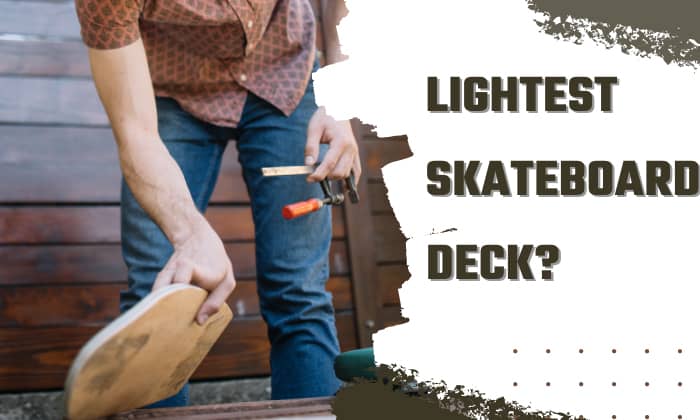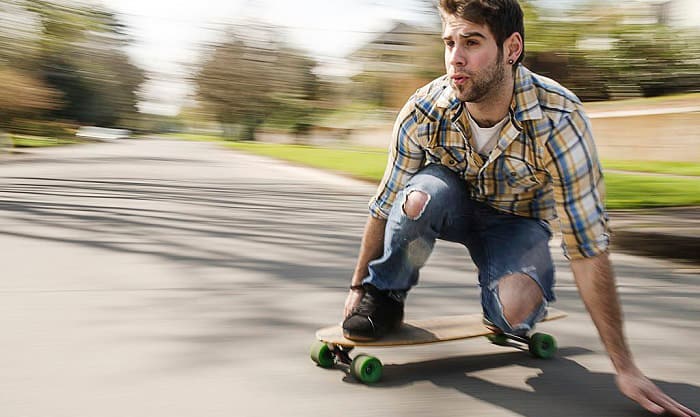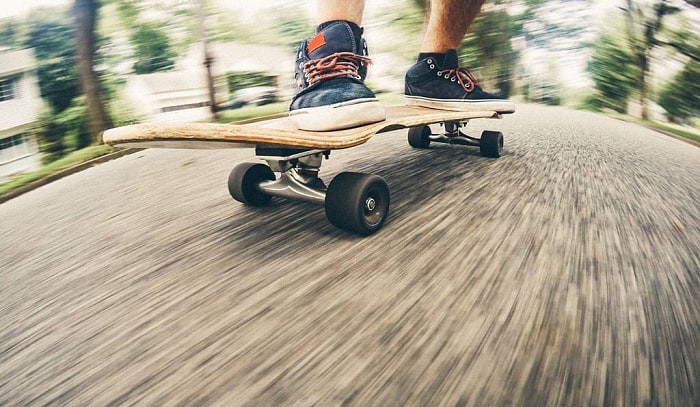When choosing skateboard parts, we always consider the combinations that would serve us the best riding experience. Otherwise, we could encounter downsides from not picking what our skating style and bodies require.
One thing we check upon browsing skateboards and related products is their weight. It’s a factor that could affect how we use the skateboard. Often, the parts we pay attention to are the trucks and deck.
Perhaps it’s entered into your curiosity. What is the lightest skateboard deck? While we might not end up buying them, it’s still quite interesting knowing how such decks exist.
| NAME | WEIGHT IN POUNDS | WEIGHT IN KILOGRAMS |
| Moose Blank Skateboard Deck | 2.51 | 1.14 |
| Powell Peralta Andy Anderson Heron Egg Flight Skateboard Deck | 2.51 | 1.14 |
| FREEDARE Blank Skateboard Deck | 2.84 | 1.29 |
| Baker Skateboard Deck | 3 | 1.36 |
| LOSENKA Maple Skateboard Deck | 3.50 | 1.59 |
| JFJ Maple Skateboard Deck | 2.71 | 1.23 |
| Almost Rodney Mullen Uber Skateboard Deck | 2.59 | 1.18 |
| Zero Skateboard Deck | 3 | 1.36 |
| ICE DRAGON Blank Skateboard Deck | 3.24 | 1.47 |
| Powell Peralta Steve Caballero Ban This | 3.10 | 1.41 |
| Blind Skateboard Deck | 2.64 | 1.20 |
| Enjoi Skateboard Deck Wallin Skart | 3 | 1.36 |
| Anti Hero Skateboard Deck | 3 | 1.36 |
Table of Contents
The Lightest Skateboard Decks
The most popular lightweight skateboard decks weigh as low as 2lbs only, though the numbers can go as high as 5lbs. The table above shows our record of the lightest yet quality skateboard decks on the market today.
So, what makes skateboard decks differ in weight? The first and probably the sole factor distinguishing one board from another is its composition.
As we know, some skateboards have 7-ply bodies, while others have nine layers. Additionally, the weight could depend on the wood type used by the manufacturer.
Are there other materials besides wood? Yes! Bamboo and plastic are next to maple wood in popularity and suitability for skateboards. And not too long ago, some brands incorporated composite and carbon fiber into their skateboards.
Skateboard Deck Weight: Does It Matter?
Perhaps, many people’s goal is to have a sturdy skateboard deck to help them perform tricks or cruise from one point to another. For them, how heavy a board is isn’t important.
But if skateboard deck weight matters, as it does, would you still not consider it?
Given some of the lightest decks above, what purposes do they serve?
Lighter skateboard decks work best for people who perform stunts or play around skate parks. Conversely, heavy boards will suit people who ride downhill or commute.
Other Parts of a Skateboard
Of course, it’s not only the deck’s weight we should consider. The lightest skateboard setup will have parts that aren’t heavy. Let’s get into other components and their heft.
- Trucks
The trucks hold the wheels and facilitate the skateboard’s turns and mobility.
Perhaps, these are the second heaviest parts of the skateboard because of their alloy content. Nonetheless, it’s reasonable that these parts have aluminum, magnesium, or titanium as their composition because of their workload.
Precisely, a skateboard truck can weigh around 350g, so that’s 700g for the whole setup. The numbers could increase depending on the manufacturing brand.
- Wheels
The wheels we choose indicate how well we can ride ramps or dodge street debris. Do they also differ in weight?
Skateboard wheels do not have uniform weights because these parts differ in size, hardness levels, and other factors. Most skateboard wheels today weigh an average of 200g to 250g.
- Bearings
Do bearings also have a significant impact on the overall weight? Probably.
Note that you have eight bearings on your skateboard on a regular day. And while each wheel core only weighs 12g to 14g, imagine how much weight eight of them add to your skateboard.
- The lightest skateboard trucks
Are you planning to beef up your deck with the lightest Thunder trucks or the lightest Independent trucks? Check out this skateboard truck weight chart to help you decide.
| NAME | WEIGHT IN GRAMS |
| Tensor Mag Light Lo | 231 |
| Tensor Mag Light regular | 252 |
| Thunder Titanium Lights | 283 |
| Thunder Polished Lights | 317.5 |
| Venture V-hollow | 320 |
| Indy Forged Titanium | 323 |
| Thunder Standard | 337 |
| Industrial | 349 |
| Venture Standard | 357 |
| Royal Inverted Kingpin | 360 |
| Ace | 363 |
| Theeve Csx | 374 |
| Independent Stage 11 Forged Hollow | 338 |
| Independent Stage 11 Forged Titanium | 312 |
What Makes Tensor Trucks So Light?
If weight is a stand-alone consideration when choosing skate trucks, Tensor makes some of the most popular and lightest skateboard trucks today. But what makes them that way?
Based on statistics, these superlight trucks weigh 11% lower than other models on the market. And what helped them achieve this? Magnesium.
What’s good about this brand is it considers how many skateboarders practice and work on stunts, thus allowing it to innovate light skate trucks.
Ask a few people on Reddit, and they would agree that the truck’s alloy component makes the difference when doing ollies, flips, and other tricks.
Magnesium makes the trucks light. So there’s less strain on the skaters’ legs and feet.
Pros and Cons of Lightweight Skateboard Trucks
As mentioned, getting into the extreme ends of a weight range could impose a few drawbacks. Let’s see the benefits of lightweight skateboard trucks and the areas we wouldn’t like.
Advantages
- Light skateboard trucks are less tiring to carry around.
- They respond quicker to outer force.
- Skateboards move faster with light trucks, making tricks easier to execute.
Disadvantages
- Light trucks cost more than denser ones.
- The hollow parts of light trucks could be a durability threat.
Frequently Asked Questions
What are trucks made of?
Essentially, the most popular materials for skateboard trucks include magnesium and aluminum. Some brands incorporate steel and titanium into the equation.
These materials may not always be solid but come hollow instead, and trucks made with them are considered light.
Are lightweight trucks weaker?
Don’t worry. The lightest longboard trucks are not necessarily flimsy. In reality, they yield more good than bad for a skateboarder.
While damage on the skateboard’s trucks is inevitable, it would be unfair to attribute the causes to their material composition alone. Other factors that could cause these parts to wear out or crack include the rider’s skating style.
Should a skateboard be heavy or light?
Using a light skateboard might yield something favorable for you. But it could also impose a few downsides.
First, light skateboards may be easier to spin or flip, thereby enabling quicker mastery of aerial tricks. But while this still needs evidence, such skateboards could be a tad disappointing in terms of durability.
Meanwhile, skateboarding on rough terrain might require heavy skateboards with rigid materials and construction. Though the extra heft can impart durability, it demands more strength from riders.
Conclusion
A skateboard does not always have to be heavy or light. After all, the best gear should suit our preference and technical knowledge. With that in mind, we should learn to consider each relevant aspect to make a wise choice.
Now that you know how the skateboard weight affects your rides, knowing what is the lightest skateboard deck will help you shop for one. Remember, the lower end of the weight range doesn’t always guarantee quality results.
So, check your skating area, assess the board parts, and consider each benefit and downside we’ve shared.

Hi, I am Charles Harris. I opened this site to write as much as I can about my biggest passion – skateboarding!
I started as a clumsy yet passionate rookie 10 years ago to now a still passionate yet much better skateboarder! But I have to tell you, the whole journey has always been fun and rewarding, indeed not without hardship.




